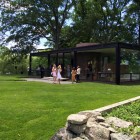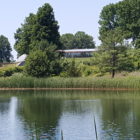Around Town
‘Our Volunteer Commissioners Deserve Better’: Judge Rules Against Town in Lawsuit Brought by Neighbors of Grace Farms
|
A judge this month ruled against the town in its decision to uphold the issuance of a zoning permit for an interior renovation of a former residential dwelling at Grace Farms.
Neighbors of the Lukes Wood Road organization in July 2019 appealed the town zoning enforcement officer’s decision to issue the permit, saying, in part, that the Planning & Zoning Commission should have been consulted—or even designated as the deciding body—as to whether the work amounted to a disallowed, more intense use of the “Operations Center” at Grace Farms.
If so, that could amount to a violation of the organization’s existing special permit, according to neighbors David Markatos and Jennifer Holme, represented in the legal matter by attorney Amy Souchuns of Stamford-based Hurwitz Sagarin Slossberg & Knuff LLC. Yet the Zoning Board of Appeals—without specifying why—denied their appeal by a 4-1 vote at its November 2019 meeting, prompting the neighbors to sue the ZBA the same month. On May 10, after about 18 months of litigation, Judge Marshall Berger of the state Superior Court in Hartford ruled against the ZBA (and Grace Farms Foundation, which joined the suit as a defendant after filing a motion to intervene in January 2020). In a 15-page decision that is at times strongly worded, Berger noted that the ZBA’s role “was limited and it was up to the [Planning & Zoning] commission to decide if the construction constituted a violation” (his italics). “Under that reasoning, after all the time the board devoted to this issue and the time and expense of this appeal, should this court dismiss the appeal, the [P&Z] commission might thereafter decide that the construction did indeed constitute a violation of the special permit thereby promoting a new enforcement action.



